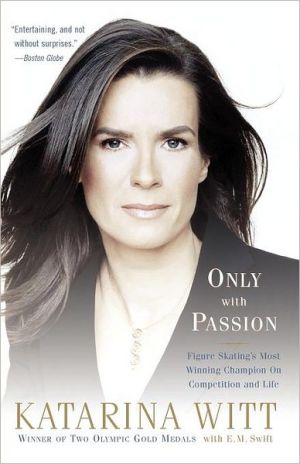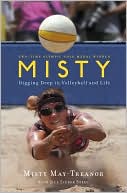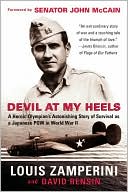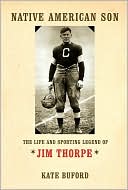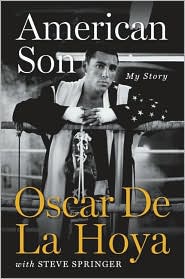Only with Passion: Figure Skating's Most Winning Champion on Competition and Life
In the glamorous, ultra-competitive world of figure skating, Katarina Witt is a living legend. She has won more titles than anyone else before her — including two Olympic gold medals, four world championships, and eight national championships. She is also renowned for independence and self-possession in a world where many stars are in thrall to management companies, and for her ability to stay true to skating while developing new careers in business, movies and television.\ Witt has always...
Search in google:
The perfect holiday gift for skating fans in the run-up to Winter Olympics XX: A living legend of women's figure skating offers her thoughtful, spirited perspective on balancing life and work, femininity and athleticism. Publishers Weekly Two-time Olympic figure skating gold medalist Witt (b. 1965) offers advice to a young skater (a composite character) on love, career and succeeding as an athlete. Using this platform, Witt discusses her training, competitions and business decisions (including her Playboy layout), and while she claims to discuss her relationships, too, she's quite vague on that front. Despite Swift's help, the writing is stilted and stiff. The glimpses into Witt's life in the Communist former German Democratic Republic are too infrequent; the few tidbits she offers, though, are fascinating. For example, she discovered by reading her Stasi file that the government had arranged for her boyfriend to be stationed in the army far away from her, so as not to distract her from her skating. Witt relates the incident with amusement; she's proud of the GDR and unafraid to defend it. The opinionated Witt deserves credit for being an inspiration to young female athletes and, perhaps, to all young women as they try to get ahead. She's unapologetic in her desire for success, even in sacrificing having a family, which she argues, refreshingly, isn't a sacrifice at all. Athletes, and figure skaters specifically, will most appreciate the lessons Witt shares. Agents, Elisabeth Gottmann and David Black. (Oct.) Copyright 2005 Reed Business Information.
Only with Passion\ Figure Skating's Most Winning Champion on Competition and Life \ \ By KATARINA WITT E. M. SWIFT \ PublicAffairs\ Copyright © 2005 Katarina Witt\ All right reserved.\ ISBN: 1-58648-274-2 \ \ \ Chapter One\ A Call for Help\ "I need your help," a familiar voice said over the phone.\ It was my manager, Elisabeth Gottmann. This was a twist, since usually I'm the one who calls Elisabeth for help. She's much more than a manager: She's my business partner, my confidante, my friend. We own a sports and entertainment company together, and when I get an idea, she's the one I call to make it happen. I'm the one dreaming up schemes and projects, the creative artist. Elizabeth is the smart, practical businesswoman. How are we going to find the financing? Who can we get for a sponsor? How much will it cost? Where's the venue? Elizabeth has a tough reputation in business, because she's fiercely protective of me. But she's also honest and fair. We make a good team.\ "How can I help you?" I asked, very cool, very professional, as if I were a concierge with all the answers.\ "I need you to talk to a friend of mine," she said. "Actually, the daughter of a friend of mine. A skater. Her name's Jasmine. Jasmine Kronheim."\ "What's this about?"\ "Skating. Life. Coming of age. It's serious."\ "Thatis serious. When does a girl come of age these days?"\ "Good question. I have an eight-year-old. She's not there yet. Close. But I still have a year or two to go, I think. Jasmine's sixteen. Quite precocious. She and her mom are not seeing eye to eye on things at the moment about the future of her skating. So I volunteered you as an independent consultant. A mediator, if you will."\ "Because I have all this time on my hands."\ She laughed. She knew my schedule. It was, as usual, crammed. "You'll like this girl, I promise. She's very independent and disarming. You may even have seen her skate when you were doing your commentating on German TV. She trains with Peter Meier."\ "My Peter Meier? From Chemnitz?" He'd coached me when I was a little girl, six and seven years old. He had to be in his sixties by now.\ "He's in Dortmund now," Elisabeth said. "That's where Jasmine's from. He thinks she could be a great skater, maybe even a champion. She has all the talent in the world. But she's outgrown the Dortmund program, and he thinks she should go train at a place where she's around better skaters. To the States-a place like Lake Arrowhead. Or maybe Simsbury, Connecticut. He wants her to see if she can get to the next level. I remembered you telling me how much it helped when you were young to train every day with skaters who were better than you."\ "And the girl?"\ "Doesn't want to go. But for the wrong reasons."\ "Meaning?"\ "A boyfriend. Well, ostensibly a boyfriend. He may just be a cover for deeper issues: fear, self-doubt, questions of identity and rebellion."\ Now it was my turn to laugh. This was beginning to sound familiar.\ "And the joke is what exactly?" Elisabeth asked.\ "It's just that some things never change."\ "Right. Like your own history of teenage rebellion? That's occurred to me, too. So you'll help?"\ "I'm so busy right now. You know how busy I am."\ "I knew I could count on you."\ "You're a pushy negotiator. Has anyone ever told you that?"\ "Never."\ "If, hypothetically, I accept this assignment, when would she like to talk?"\ "I didn't say she wanted to talk. Her mother wants her to talk. She's one of my oldest friends, Kat. The sooner the better. Today, if possible."\ "Not today."\ "Then tomorrow. She's planning to visit Berlin anyway. She has friends in the city, but I already suggested you could put her up for a few days. I know your schedule, and you can fit her in."\ "But tomorrow? So soon? I have the appointment with the sound studio to edit the music for the new show-"\ "That's this afternoon."\ "And I have to train. Frau Muller is coming-"\ Elisabeth could hear the panic in my voice. "Perfect. Take her with you. You don't have guests, do you?"\ "No, but ... Oh, Elisabeth, you're impossible."\ "I wouldn't ask this of anyone else. This came up quite suddenly, and her mother's in a panic. Jasmine's told her she wants to stay in Dortmund. She's threatened to leave school and move in with her boyfriend, who's a bartender. She'll give up skating and work as a waitress, if necessary. At sixteen! Call Peter Meier. The girl's got talent. He doesn't want her to waste it. Her mother can't talk to her about it anymore, and the father-don't get me started on him. Moved out two years ago and doesn't see why he should help pay for her lessons anymore. He won't even sign the divorce papers. A disaster. Forget him. Jasmine needs to hear from someone besides her mom, and I happen to know she's always looked up to you as a role model. The thoroughly modern woman: independent, athletic, but still, you know, attractive to men."\ "What about you? You're attractive to men."\ "Not in her eyes. I'm a neuter. An ancient. Worse than that: a mom. And no one ever asked me to pose in Playboy, which is a pretty cool thing to a girl like Jasmine. Besides, you're the one who skates. That's the thing about it: She loves skating. She loves to compete. Just like you. She didn't start skating until she was six, so she's still catching up with those little girls whose mothers pushed them out there as four-year-olds. But her learning curve is very steep. She has all the triple jumps and so much potential."\ This was beginning to sound interesting. I could still remember what it was like to be a strong and willful teenager defying the wishes of my parents because of a boy. I could relate to young Jasmine.\ "Are you sure about this?" I asked. "You may not like what I tell her. I'm not a mother."\ "That's the point," Elisabeth said. "That's why she'll listen. Better it be to you than to one of her friends."\ "All right. Tell her I have some things planned this week, but she can stay as long as she wants. Let me know what train she's on. I'll try to meet her."\ "She has your address. She can walk."\ "I'm just five minutes from the train station."\ "I know. She'll manage. Thanks, Kat. For everything. I'll let you know when to expect her. This is just what she needs."\ "We'll see. She's not going to be one of these sullen, vapid teenagers? She does have personality, right?"\ "Bucketsful."\ "I'll call you after she's settled."\ "Love you, dear. Good luck."\ It had been a long time since I'd thought about what it was like to be sixteen. Life changes so quickly at that age. I became European champion at seventeen, and Olympic champion at eighteen, winning my first gold medal in Sarajevo in 1984. A few months later, at the annual youth festival of the German Democratic Republic, I met my first boyfriend, Ingo, a drummer in a rock band. Though he looked young, he was twenty-five, seven years older than me, which is a huge gap at that age. His band was performing at the youth festival, and so was I. The lead singer was having a cup of coffee with me backstage, and I thought, "Hmm, he's kind of cute." He was interested in me, too. But then Ingo came up, and he was much younger and cuter than the singer. He had a little, tiny nose, which I always made fun of. And the brightest blue eyes. I fell for the drummer.\ Ingo was such a sweet boy. Up until then I'd only spent time with other athletes, guys who treated me as a friend, a tomboy. Now for the very first time, here was a boy who made me feel like a girl, who brought me flowers. And he was a musician! I was really intrigued by him. Unannounced, he'd make the four-hour drive from Berlin to Chemnitz, where I trained, to pick me up after practice. That was so new to me. He was the opposite of an athlete: soft and gentle, not really a manly type. No big muscles. Very skinny. But I liked that. He had long dark-blonde hair and wore adventurous clothing, like bold, striped pants. He stayed out late and smoked cigarettes. The sportsmen I knew were more clean-cut. They had short hair, went to bed early, and for the most part, lived a disciplined life. What a difference! And on top of all that, Ingo was very much a gentleman in the way he treated me. Completely. Which is not the way you think of a musician in a rock band. That really flattered me. I fell in love with him despite the difference in our ages.\ When he visited me, however, my parents were very strict. They didn't accept him and wouldn't let him stay at our home. So Ingo and I had to take a hotel room every time he visited, and he finally decided: I don't need this. Not at twenty-five. That's when I realized I needed my own apartment. I didn't want to lose Ingo, and I needed to start having my own life.\ Eighteen, and wanting to live in my own apartment. It seems so young now. But the world I grew up in was so very different than it is today. I was an elite athlete, which was of high importance in the GDR. I had a handler who was responsible for making sure I could concentrate on my sport, that I suffered as few distractions as possible. This person was not a coach but was more like a supervisor, a facilitator. Someone well connected I could go to if I had a problem. It was this person I asked about getting my own apartment, which was a special privilege in East Germany, and I was told if I won another European championship-I'd won my first in 1983-then an apartment would become available. And that became my goal.\ As promised, when I became European champion again the next winter, I got my apartment. It was a tiny one-bedroom with a kitchen and a bathroom. The entire place was the size of my kitchen today. It was in Chemnitz, just a five-minute drive from the apartment I lived in with my parents. And it wasn't as if they just gave it to me. I paid rent for it. But I had money from the government for winning the Olympics. In this hidden way, all the East German athletes were really professionals. But the authorities always had a hand on the money. It was kept in an account controlled by your handler, and when you wanted it, you had to ask for it. If you'd been doing well, you'd get it. If not, maybe you wouldn't.\ My parents didn't know about the apartment, and I couldn't bring myself to tell them. I kept living at home, slowly fixing up my new place without their knowledge. My mom, Kate, worked as a physical therapist. My dad, Manfred, sold seeds to farmers. They worked hard. But the secret finally came out when I left for Tokyo to defend my World Championship title in March 1985.\ In East Germany, the residents were responsible for cleaning the hallway floors of their apartment buildings. One person organized the schedule, and the tenants traded off in a rotation. While I was away at the World Championships, the scheduler in my building visited my parents wanting to know who'd be responsible for cleaning when my turn in the rotation came. Of course this was news to them, and not pleasant news. That's how they found out I was preparing to move out of their home.\ When I flew home from Tokyo, they came to the airport to meet me. Even though I'd won the World Championships, they were very quiet, which was unusual and awkward. My father told me what had happened, about the man coming by to discuss the cleaning. He said neither he nor my mom would have anything to do with my new apartment. I'd have to organize everything: the furnishing, the painting, the cleaning, the maintenance. My parents wouldn't lift a finger. My dad wouldn't so much as pound a nail into the wall for me. It was so unlike him. Clearly, they were hurt that I wanted to leave, but I'd made up my mind and wasn't going to back down. I didn't want to make them upset, but moving out of their apartment was the only way I could move forward with my own life. Eventually they'd understand that. It took a very long time before I had the apartment fixed up enough to move in, because of the hours and hours of training I had to put in every day. But members of my sports club pitched in, and six months later I was living on my own.\ It was then that I learned a valuable lesson: You can rebel from your parents without losing them. Although we had a very strained relationship during that period, I knew that my parents still loved me. They were still my parents. I didn't want to lose them. So I kept the communication lines open. I'd come home and sit and talk with them. Finally, after some months of this tension, my mother said, "Okay, bring me your laundry. You're busy. I'll do it for you." That's when I knew everything was going to be fine.\ I ended up having a much better relationship with my parents than I'd had before. When I was living with them, I left the house in the morning in time to make a 7 a.m. practice and wouldn't get home until 6 p.m. I'd be exhausted. We'd have dinner together, watch TV, then go to bed. It was always the same. We never talked about things. I didn't want to talk to them anyway, because I was in those teenage years when I only wanted to do things my own way.\ Once I moved out, however, once I had my own space, I became more of a visitor at their home. That was nice because we made time for each other, instead of wasting our time. We started to talk in a way we hadn't when I lived there. My relationship with them became much closer than it had ever been before. I'd visit even if I didn't have laundry to do. In a way, they won me back, because now we were spending more quality time together. I still had my freedom, my own space, my own life. For everyone, I think, it turned out better.\ I wondered if something like that was happening between Jasmine and her mother. It sounded as if Elisabeth's friend's daughter was at the stage where she only wanted to do things her own way. When you're a teenager and have a serious boyfriend, all you really want to do is spend every second with him. Stay out late at night. That isn't good for an athlete in training. It used to drive my coach, Frau Jutta Muller, crazy. It was even harder on her than on my parents. But for me, even after I met Ingo, skating was always the top priority. I never lost sight of that. I knew where my future lay. I was curious to find out if Jasmine felt the same way.\ (Continues...)\ \ \ \ \ Excerpted from Only with Passion by KATARINA WITT E. M. SWIFT Copyright © 2005 by Katarina Witt. Excerpted by permission.\ All rights reserved. No part of this excerpt may be reproduced or reprinted without permission in writing from the publisher.\ Excerpts are provided by Dial-A-Book Inc. solely for the personal use of visitors to this web site. \ \
\ From Barnes & NobleSome people will remember her best for her Playboy pictorial, but Katarina Witt's greatest claim to fame is her peerless record as a figure skating champion. During her astonishing career, she won two Olympic gold medals, four world championships, and eight national championships. Even as she prepared for her post-skating career, she remained competitive. In this candid autobiography, the East Germanborn beauty describes how she developed her skills and balanced them with her need for fulfillment and companionship. Witt's strong streak of independence gives Only with Passion a vibrancy that her skating fans will recognize.\ \ \ \ \ Publishers WeeklyTwo-time Olympic figure skating gold medalist Witt (b. 1965) offers advice to a young skater (a composite character) on love, career and succeeding as an athlete. Using this platform, Witt discusses her training, competitions and business decisions (including her Playboy layout), and while she claims to discuss her relationships, too, she's quite vague on that front. Despite Swift's help, the writing is stilted and stiff. The glimpses into Witt's life in the Communist former German Democratic Republic are too infrequent; the few tidbits she offers, though, are fascinating. For example, she discovered by reading her Stasi file that the government had arranged for her boyfriend to be stationed in the army far away from her, so as not to distract her from her skating. Witt relates the incident with amusement; she's proud of the GDR and unafraid to defend it. The opinionated Witt deserves credit for being an inspiration to young female athletes and, perhaps, to all young women as they try to get ahead. She's unapologetic in her desire for success, even in sacrificing having a family, which she argues, refreshingly, isn't a sacrifice at all. Athletes, and figure skaters specifically, will most appreciate the lessons Witt shares. Agents, Elisabeth Gottmann and David Black. (Oct.) Copyright 2005 Reed Business Information.\ \
